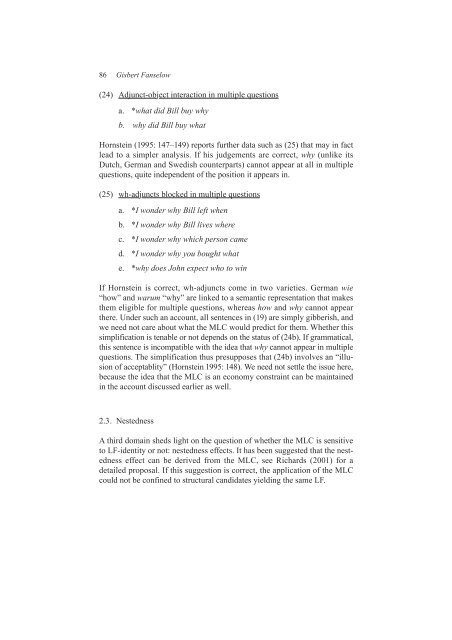Minimality Effects in Syntax · The MLC and Derivational Economy ...
Minimality Effects in Syntax · The MLC and Derivational Economy ...
Minimality Effects in Syntax · The MLC and Derivational Economy ...
You also want an ePaper? Increase the reach of your titles
YUMPU automatically turns print PDFs into web optimized ePapers that Google loves.
86 Gisbert Fanselow<br />
(24) Adjunct-object <strong>in</strong>teraction <strong>in</strong> multiple questions<br />
a.*what did Bill buy why<br />
b. why did Bill buy what<br />
Hornste<strong>in</strong> (1995: 147–149) reports further data such as (25) that may <strong>in</strong> fact<br />
lead to a simpler analysis. If his judgements are correct, why (unlike its<br />
Dutch, German <strong>and</strong> Swedish counterparts) cannot appear at all <strong>in</strong> multiple<br />
questions, quite <strong>in</strong>dependent of the position it appears <strong>in</strong>.<br />
(25) wh-adjuncts blocked <strong>in</strong> multiple questions<br />
a.*I wonder why Bill left when<br />
b.*I wonder why Bill lives where<br />
c.*I wonder why which person came<br />
d.*I wonder why you bought what<br />
e.*why does John expect who to w<strong>in</strong><br />
If Hornste<strong>in</strong> is correct, wh-adjuncts come <strong>in</strong> two varieties. German wie<br />
“how” <strong>and</strong> warum “why” are l<strong>in</strong>ked to a semantic representation that makes<br />
them eligible for multiple questions, whereas how <strong>and</strong> why cannot appear<br />
there. Under such an account, all sentences <strong>in</strong> (19) are simply gibberish, <strong>and</strong><br />
we need not care about what the <strong>MLC</strong> would predict for them. Whether this<br />
simplification is tenable or not depends on the status of (24b). If grammatical,<br />
this sentence is <strong>in</strong>compatible with the idea that why cannot appear <strong>in</strong> multiple<br />
questions. <strong>The</strong> simplification thus presupposes that (24b) <strong>in</strong>volves an “illusion<br />
of acceptablity” (Hornste<strong>in</strong> 1995: 148). We need not settle the issue here,<br />
because the idea that the <strong>MLC</strong> is an economy constra<strong>in</strong>t can be ma<strong>in</strong>ta<strong>in</strong>ed<br />
<strong>in</strong> the account discussed earlier as well.<br />
2.3. Nestedness<br />
A third doma<strong>in</strong> sheds light on the question of whether the <strong>MLC</strong> is sensitive<br />
to LF-identity or not: nestedness effects. It has been suggested that the nestedness<br />
effect can be derived from the <strong>MLC</strong>, see Richards (2001) for a<br />
detailed proposal. If this suggestion is correct, the application of the <strong>MLC</strong><br />
could not be conf<strong>in</strong>ed to structural c<strong>and</strong>idates yield<strong>in</strong>g the same LF.
















